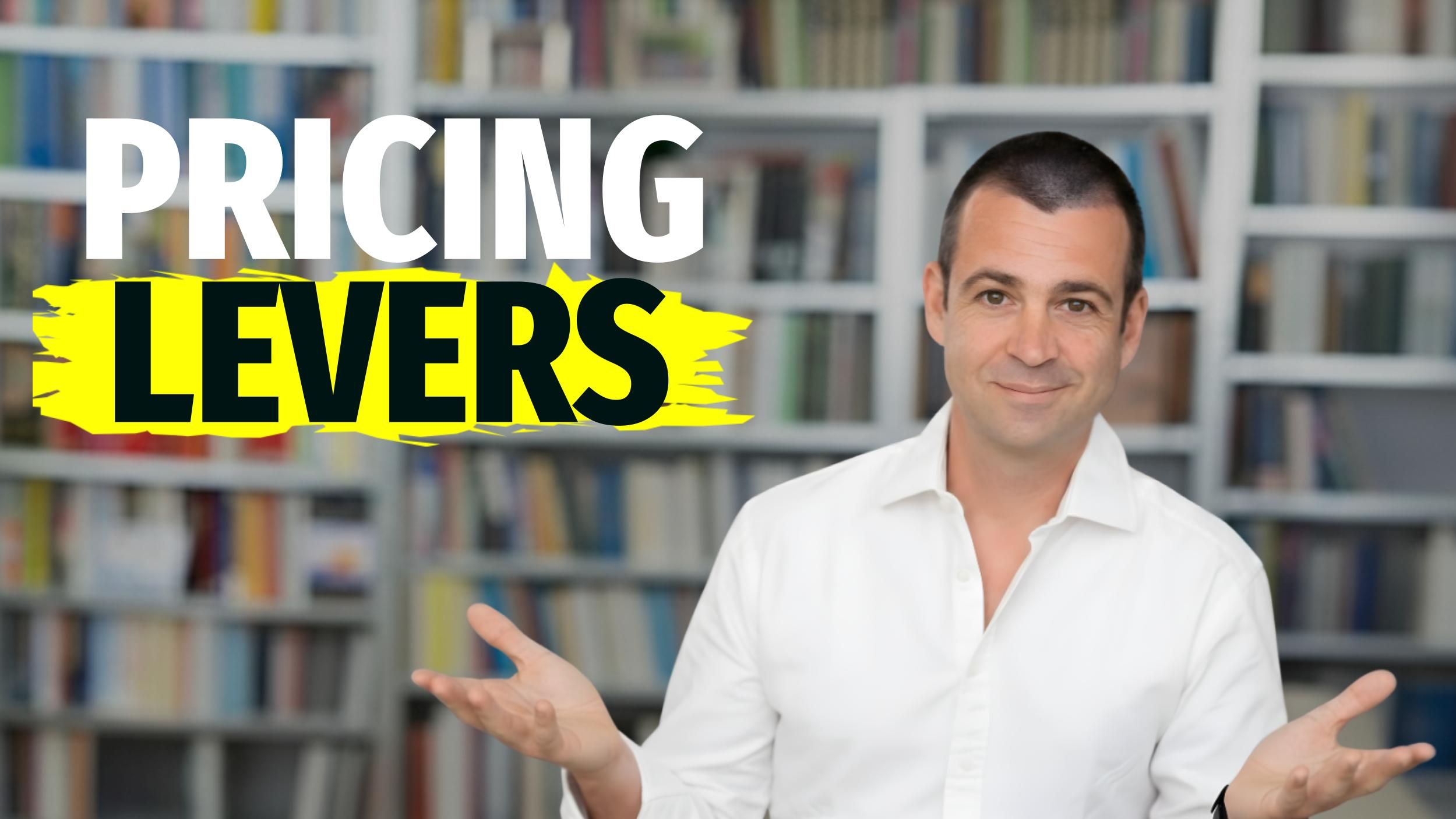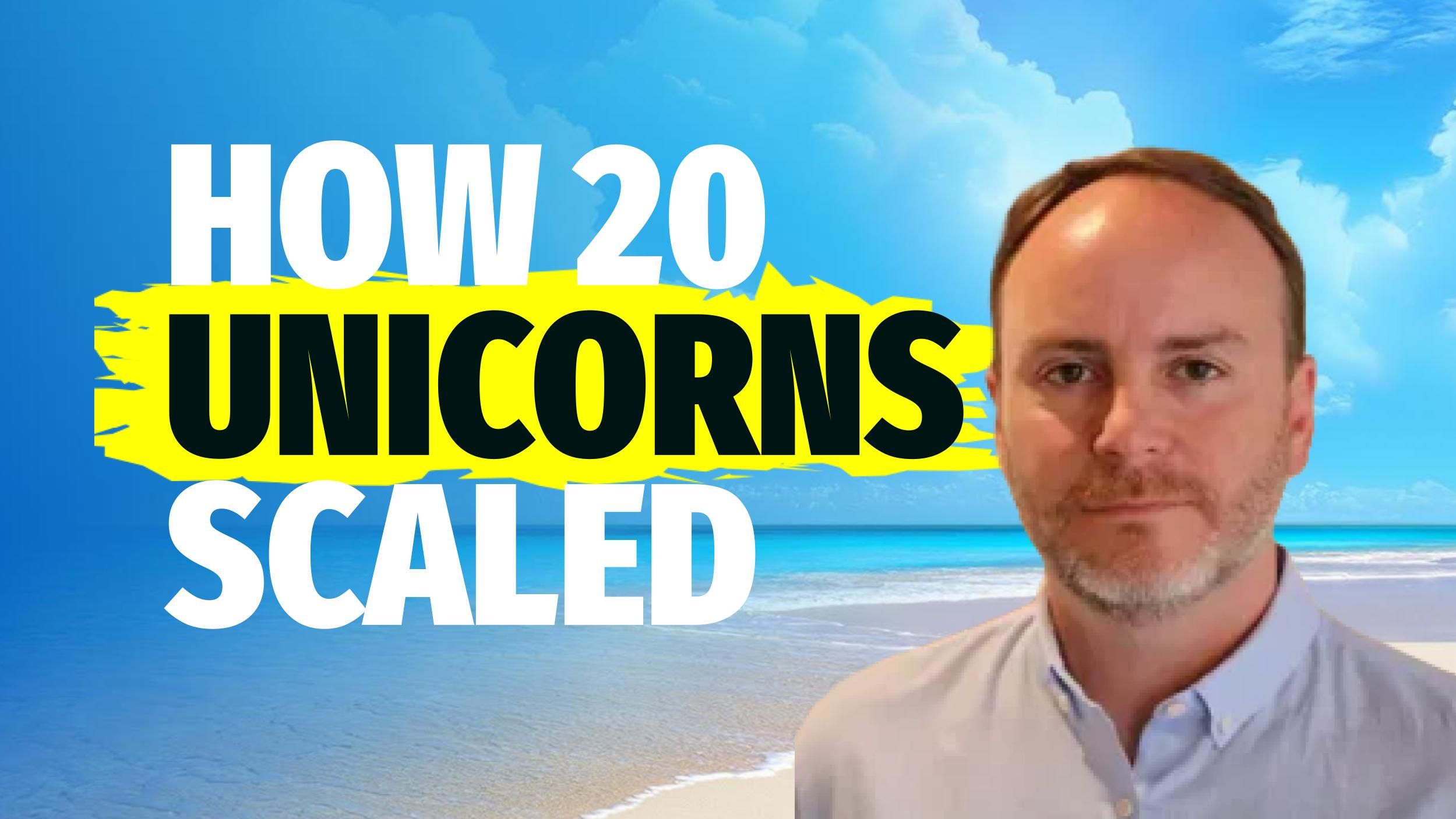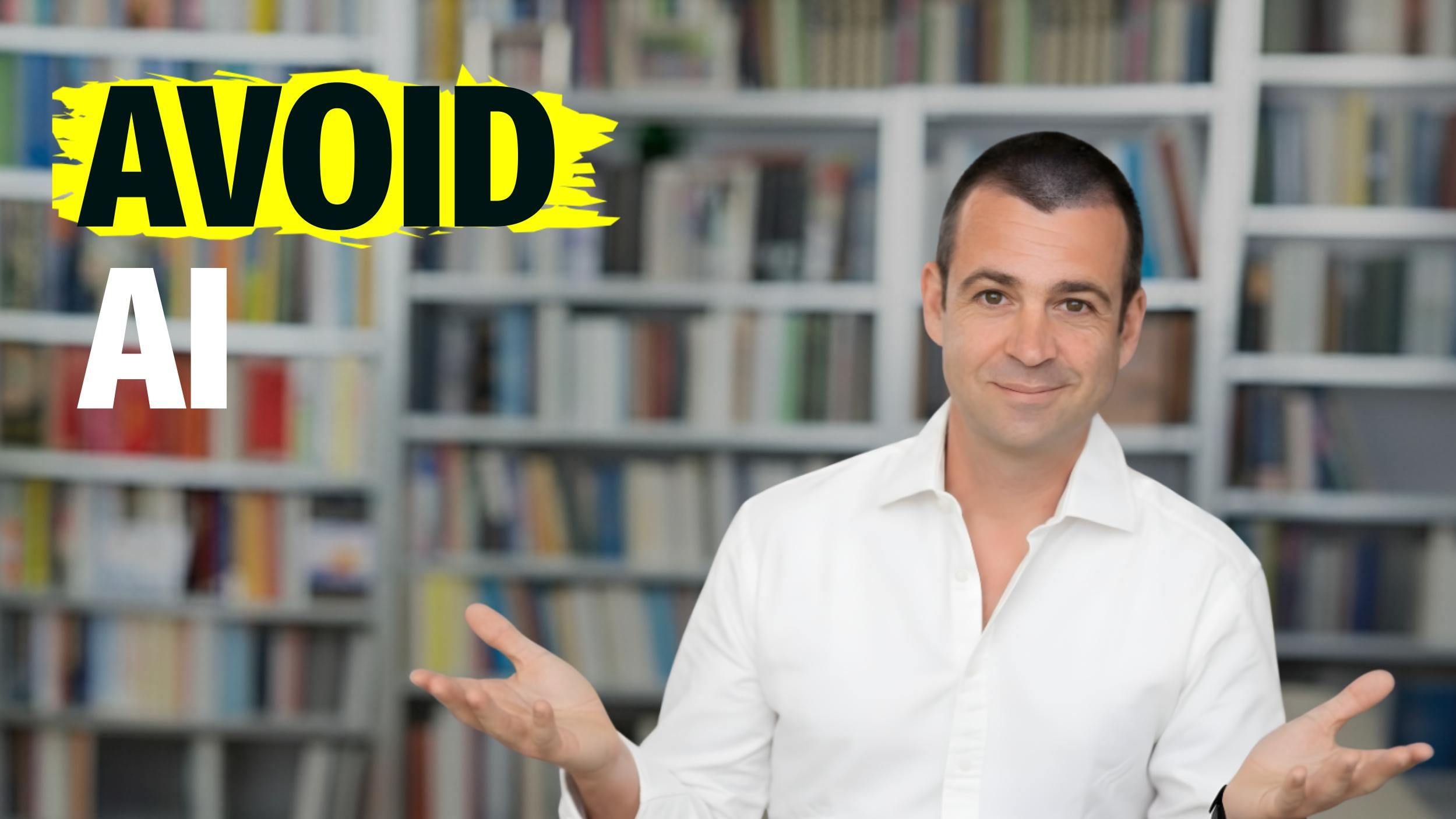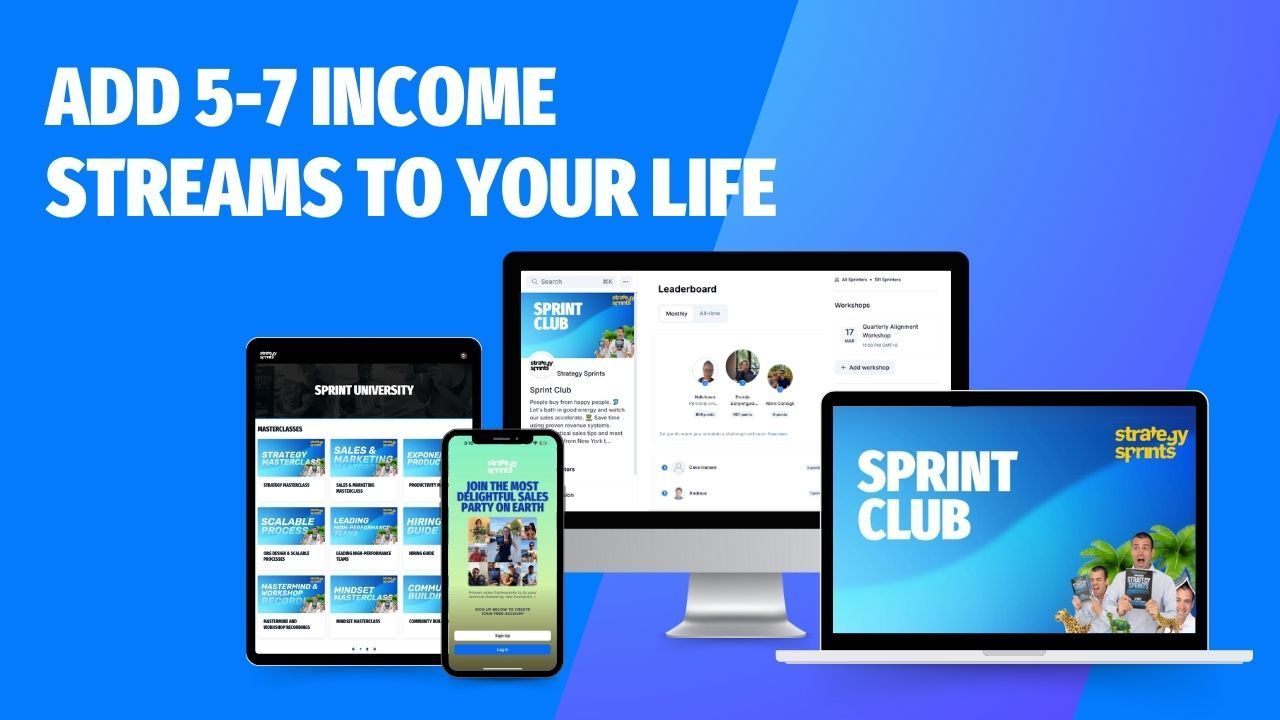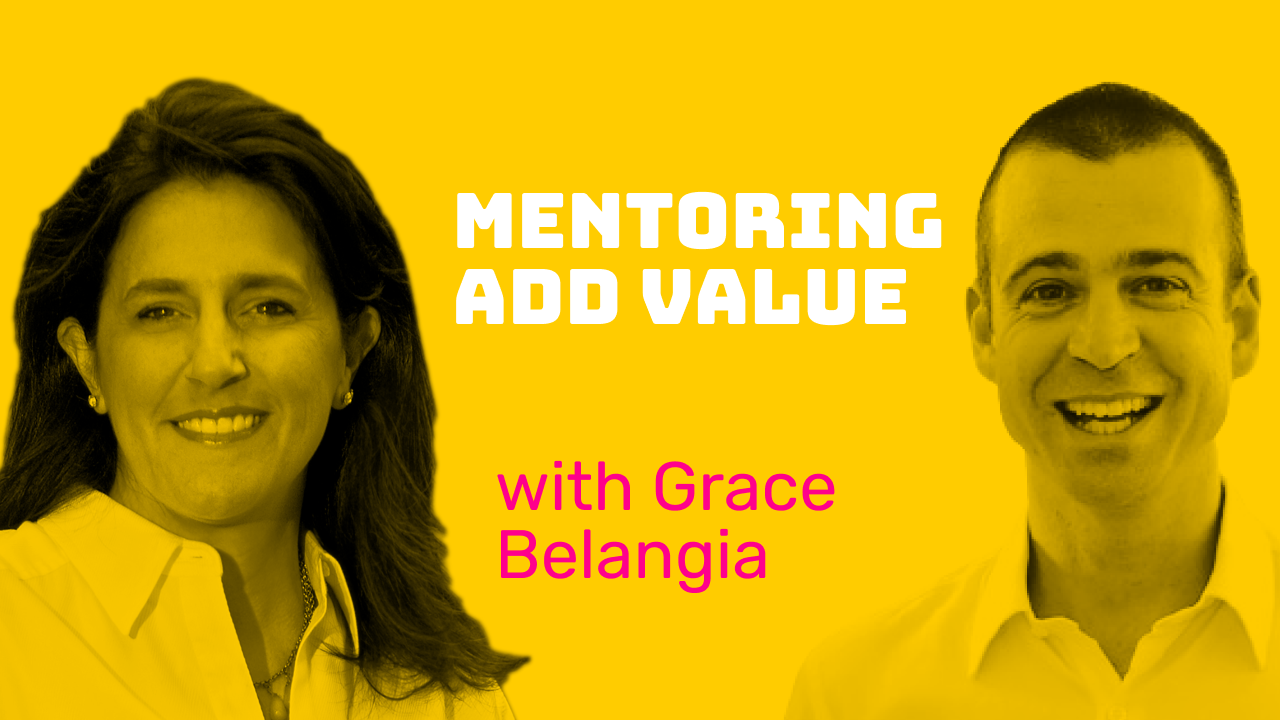
Mentoring Add Value with Grace Belangia | STRATEGY SPRINTS 148
In this episode, Simon and Grace, the co-founder of Clubhou.se, will introduce ESO and its resources, and will discuss about mentoring, and effects of creating a diverse team. Grace Belangia founded Clubhou.se, an innovation center that helps new startups and entrepreneurs with plentiful resources, courses, and bootcamps, in 2012. In 2018, she co-founded MakeStartups, and is now launching pilot programs to connect capital partners and ecosystem builders across the US to help with the startups. Join and listen this episode to learn how to make your business and the cities more powerful and vibrant.
Three valuable insights:
- Partnering with entrepreneur support organizations can help startups to be more successful through using diverse resources offered by ESOs.
- Mentoring is a wonderful experience. It's about a give and take.
- You're going back to who your audiences, so have a broad team cause they're going to bring perspectives to you.
Simon (00:15):
Welcome everybody to the Strategy Show. I'm your host Simon Severino. And today with us, she grew up in Silicon Valley, she co-founded the Clubhou.se, an innovation center that connects leaders and learners, funders, and founders across industries. She is currently launching pilot programs, looking for capital partners and ecosystem builders to support startups. Hello everybody, Grace Belangia.
Grace (00:44):
Hello, hello, hello. Nice to see everybody.
Simon (00:47):
Grace, what are you currently creating?
Grace (00:51):
So we are creating here in in the United States, a platform to help entrepreneurial support organizations, so organizations that are sort of the funnel to entrepreneurs in their communities, and it's a division of the Clubhou.se, which is the nonprofit that I helped found about eight years ago. And that make the company that the division that we have is now called “MakeStartups,” and MakeStartups is the division that we're helping to use across the country to pilot cities that want to help entrepreneurs support organizations.
Simon (01:28):
So if I am a city, I should contact you.
Grace (01:33):
You can. Yeah. And I can… If you can tell them the website really quick, I need to go drop off these keys in emergency. Give me like 10 seconds.
Simon (01:42):
We will talk about why you should consider invest in ESO, why mentoring can add value to cities to make them vibrant ecosystems, and why diversifying teams can broaden wealth creation and customer acquisition. So let's go directly to the first one. What is an ESO? Why should we consider investing in it?
Grace (02:08):
So entrepreneur support organizations is sort of an emerging career. And I think a lot of us would define ourselves in that space. ESO are anywhere from people that work for accelerators or incubators. If you work on a main street, like a marketing group, if you work with your chambers of commerce, anything that has to do with economic development, it really is the person or the organization that will take an entrepreneur, somebody who's like, hey, I have an idea, or I have a business, I want to scale it, how do I connect to this next thing? And the next thing could be, you know, anywhere from creating a pitch deck, to going on a road show, to applying, to accelerators, to getting government funding, to finding venture capital, to learning about business plans and stuff. So entrepreneur support organizations are the conduit to an entrepreneur, ultimately being more successful than if they hadn't partnered with that kind of organization.
Simon (03:10):
And what's currently keeping you up at night. What topics do you have right now?
Grace (03:19):
How much time do you have? You know, it's interesting because we've been doing this work for seven or eight years, and I think that this year with all of the world's health and racial protesting, that the discussion about equity, that discussion about marginalized communities, discussion about public health has really been put to the forefront. And it's things that we've always been sort of talking about. So a lot of the discussions have been amplified. And so what keeps me up at night is the ongoing conversation to try and just, you know, move the needle incrementally day by day, whether it's at the local state, federal, even the international level to have a dialogue, because at the end of the day, we're talking with people about the things that are in place or not in place to help other people improve themselves. Because at the end of the day, I think we all want to improve not only ourselves, but the world and the earth and the place that we live in. And that's related to job creation. That's created to wealth, that's created for providing, you know, an economy that you get a fair living wage that you can provide for your family. And so all of those things navigate through my mind at night, how do I help improve that pipeline?
Simon (04:31):
Absolutely. And what has been your experience of this year, specifically? What were maybe some pivotal moments in all this funky year?
Grace (04:46):
I think a few political moments, but one for sure was in March, you know, we sort of saw the tide coming, you know, whether it was through the media or just through the CDC. Here again in the States that were telling us about a pandemic. And so you know, to put yourself sort of in a crisis mode really makes you hyper aware of what's important, and what's not important. How do you protect? And so in our space, you know, we went into like a triage of how do we protect our team, our members, how do we get everybody the right resources? You know, you scrambling like two or three days. And that was certainly a pivotal moment in our organization. And then, you know, within a few days we were all online, and because we work in the technology space and a lot of our companies and members are on the technology space, they were able to sort of navigate temporarily what we thought at the time was this like, okay, let me just do this online for a while, let me just take a hiatus, let me pivot, whatever word you wanna use.
Grace (05:41):
And then in the summer there was sort of like another pivot. And that was mostly when the racial protests started and all of the summer, more issues happened, and how did the communities, again, sort of try to come together to have discussions. And so we internally did a lot of that in our organization. We redefined our mission, we restructured, you know, the why of what we're doing and how to, again, amplify that discussion to bring in more people, to help more people, again, doing this in the virtual space. And then I think the third moment was probably just in the fall again, where we're like, you know what, we're going to have to do this for awhile. So let's put on almost like a survival tactic. Like we got through the emergency. Now we're maintaining it. Let's make sure that we don't close. Let's make sure that we can provide even the basic necessities. And I think that's kind of where we are right now. Getting ready for some new, exciting things next year, though, too.
Simon (06:45):
So you are building communities and during the lockdowns, how do you keep communication alive? How do you keep the space safe? What are you learning about community building in this special situation?
Grace (07:01):
I think it's kind of a, probably like a lot of communities, it's a hybrid model. You know, we went from being all virtual to not really a hybrid model in terms of like I'm meeting with you, you know, in crowded spaces or anything, but we've done some outdoor social distancing things, we did sort of hibernate, some of our social events. You know, we did some networking events and some after-hour events, and some technology, you know, educational events. And we sort of had to put those on hold for awhile, but, you know, we've joined other communities, other virtual communities talking to people like you, you know, across the pond, like getting out the message beyond just our geography has allowed us to do this with Zoom, you know, talking to CEOs, talking to VCs people that we wouldn't have been able to talk to, you know, six months or a year ago, we can get into a conference. I just… I came back from a three-week virtual road show. I went to like four conferences in three weeks, you know, all virtual. But you know, meeting hundreds of people talking just about like what we're talking about. So, yeah, that's kind of where we are right now.
Simon (08:10):
So I was flying a lot before 2020 and then grounded, and I realized my hunger for community. So we are right now so active in our communities. And the number of giffies that we send, like just pure emotional communication, has raised a lot. So, and I see also the need for connection, for real conversations, especially around topics that are emerging right now, like what is a fair society? What is a nurturing relation? How do we make sure that respect happens in every single place, and how do we react to it when it's not happening… All these conversations that we wanted to have all the time, but now it's easier to talk about it, but on the other side, yeah, how to enable the community to stay alive and to grow and to nurture are such interesting topics. And before we continue, I want to ask you about this strategy award. So if you can pick only one person who, when everybody's zigging, this person is zagging, who is this person?
Grace (09:54):
I mean, I, I certainly have a few people in my mind that I've seen sort of navigate the world, especially in the last six to nine months. But if you don't know who Brad Feld is already, I would highly recommend that you follow him on Twitter. He's a venture capitalist that I've gotten to know over the last couple of years. And he was really adamant in the summertime about having uncomfortable conversations about racial inequity and really challenging the greater community, including himself to do something about it. And so I think that, you know, he would be to me a champion who has not only the influence, but the connections and the empathy to help people in not even, not just, you know, in our country, but probably around the world just to really really improve their lives. And he's investing not only his money, but his time and his network. And that's something that I would love to see other people in that space follow follow his lead, because I think it could be very transformative. And sometimes at the end of day, all you need is just really one person to say, okay, I'm doing this who's in? And then it just, it opens the floodgates for so many other wonderful things to happen. So I would give kudos to him.
Simon (11:08):
Wonderful. And let's go to your second CEO tip. Mentoring can add so much more than we think. Can you impact that?
Grace (11:18):
Yeah, I think in some ways, you know, it's agnostic in the sense that it doesn't matter if you're young or old, black or white, female or male. I think as we evolve, we have something to give back. And a lot of times it's just our life experiences. And it can be, you know, somebody who went through the same career or went through the same relationship or went through the same business, and you can learn from those people. And I think that it's a give and take, because I think even, you know, at my age and stage, I have mentors that are younger me. You know, I might've said that I've done this work, but they're really mentoring me and their perspective on how to move forward in life.
Grace (12:00):
And I think that mentoring is a wonderful experience. It's a give and take. I think that there's a value in it. And so again, we work in a space where we depend a lot on volunteers, but I think there's also the capacity, and whether you call it a consultant or a coach where you can create some karmatic capitalism to the mentoring process, because some of that is priceless for the next person. And if it's somebody that's up and coming and they are wanting to start a business, I generally firmly believe you don't do it on your own. Somebody has opened the door for you, whether it was, you know, giving you advice, giving you money, giving you space, and so mentoring can fall into a lot of different ways. And I think, you know, giving credit or credit to do that, they can transform somebody personally and professionally. And even for the mentor, it's a part of, you know, again sort of giving back and paying it forward in that space. And again, that's sort of the stuff that some of the ESOs do around the countries is we mentor.
Simon (13:06):
You are, I guess, one of the first here on the show to explicitly say that some of your mentors are younger than you. I experienced this myself. So in my twenties, in my thirties building my businesses, my mentors were 60 70, because there were people who did it and who had the experience, then in my forties now my mentors are 26 35 because it's changing, because the technologies where I need to learn a lot about, they are much more prolific there. And basically, if I would stay with my traditional mentors, I will just learn more of the same, but that doesn't really move the needle forward right now because what is the same right now? Nothing is the same.
Grace (14:06):
Yeah. I think technology is a really great example. You know, I’d give a shout out to my kids, you know, 20 and 23 right now, because they're teaching me, you know, how to look at the world, you know, even just from a like philosophical way, but in addition to like just how to use all the gadgets and so mentoring in that space, because I mean, at the end of the day, again, it goes both ways, right? So there were customers 50 years ago, there were customers 10 years ago, there's going to be customers in 20 years. And so as an entrepreneur, you're like, how do I find my customers? How do I serve my customers? How do I engage in hospitality? How do I create a business model around my passion project? And I think, you know, you'll see that over the generations and decades, we're using different words, we're using different, different ways to make those things happen. I think technology is sort of speeding it all along, but yeah, the mentor space, you know, don't dismiss those that are younger than you cause they can really teach us something for sure.
Simon (15:02):
Absolutely. So I'm in a mastermind right now with for example, Ali Abdallah, Hey Ali, you are the best. And that he is such an amazing storyteller. He has millions of followers on YouTube, of course, because he's such a master of this craft and because of his age and because of his background, and his uniqueness, he has of course a different take. And I'm learning so much from him. This is just one example and also perspective on which channels work and which channels don't work. This is completely different from where I come from. And that diversity is really value adding in every field, which is also your third CEO team, diverse teams. Why do they matter?
Grace (15:54):
Well, I think it goes back to you know, the kind of companies that we see through our space. And so depending on the niche that you're in, if you're thinking about a lifestyle company, if you're thinking about a consumer brand, if you're thinking about a technology, even a mobile app, you know, you're going back to who your audiences, and then with it within the niche, I think you still have to have a broad team cause they're going to bring perspectives to you. And they're going to be perspective based on their culture, based on their gender, their race, their education, their economics. And I think that's where, again, whatever it is that you're sort of putting out into the universe, you want someone to be able to receive it and they can see if it's directed to them in a way that they understand it.
Grace (16:37):
And so to have a diverse audience, really amplifies the messaging of what you're doing, and it could be anywhere from the logo to the brand, to the website, to where you're marketing, who you're marketing it to the price point. And it's okay that you can't be all things to all people, but as you grow your team, I think you want to be able to bounce those ideas off of other perspectives. Because if there are people that just look like me and might think like me and act like me, I'm not really going to have a diverse revenue stream either because it's going to be pigeonholed into that particular directive and not really respect that there's, you know, a gazillion other people out there that might not look like me, think like me, or act like me, but might actually want to do business with me, so to speak.
Simon (17:21):
Were you recently pouched by any book or audio book about entrepreneurship or community building?
Grace (17:31):
I do that into a few books every so often. I mean, Brad Feld just came out with a new book. It was kind of a follow-up to his first book, Startup Community. And I've been diving deep into that. It's sort of the idea that, you know, the process of what it takes to sort of build a community from scratch, if you're going into a city or you don't know how to build an entrepreneurial ecosystem takes years and years, and what does that look like? I listen to a lot of podcasts. The reboot podcast is great. I get a lot from that. It's a weekly podcast as well as a blog. So I've kind of pulled different content from different places. Unfortunately, I'm on my computer and phone a lot just to kind of get that information, but sometimes I'm old school and just down right by the book.
Simon (18:16):
Beautiful. What did you recently change your mind about recently?
Grace (18:27):
I don’t know, that's a really good question. The fluffy kind of answer is I've been trying a lot of kombucha, and I don't know if you know what that is. It's a, yeah, it's a tea, it's a tea. And when I first tried it, you know, probably a couple of years ago, I probably made the mistake of drinking a lot of bitter versions of it. And, and I kind of have a sweet tooth, and then I realized that there was like an alcoholic version. So then I tried that, and that sort of found this like, happy medium, where there's a sort of like sweet non-alcoholic version. So I've changed my mind to think like, Oh yeah, I really liked that drink. I know that sounds kind of trivial, but it's, it's something where, you know, to me, it's like a pioneering beverage in our markets. And so to see how many flavors are out there and how many brands are out there, I'm thinking like, oh, that's a, that's a great balance between, you know, whether I want to drink an alcoholic drink, or I want to drink water, or I want to drink soda. What's something in between. So I've changed my mind, I've come around. I think it’s great.
Simon (19:21):
Cool. And who should be my next guest?
Grace (19:26):
Who should be your next guest? Well, I always give credit to my co-founder Eric Parker, because he was the one who pioneered the idea of the Clubhou.se here, here in Augusta, Georgia. And his background in architecture really amplified the idea of, you know, what buildings do to communities, and how does that work and how do you create something to bring people together to innovate. And the Clubhou.se in and of itself was just a bunch of clubs that came together in the space. And I'm actually in one of the spaces right now. There's smart work behind me that he created. And it was really the intent to say, after we were doing this for a couple of years, getting other communities coming to us, say, how do we do what you did? Like, how did you start this?
Grace (20:07):
How did you maintain it? What's your business model? Where do you find your community? And that's again, sort of where make startups went off, and partnering with other communities and cities, you know, across the country, we're piloting cities right now. Doing some in Georgia, some in Colorado, some in California, but we intend to amplify it across the country, so that they can access some funding that they might've not been able to access before to really keep the doors open, to provide education, mentoring, and space. Because at the end of the day, a lot of entrepreneurs can't afford that. And so if you have the funds to do it, then it's kind of a win-win for everybody.
Simon (20:43):
So cool. Is there anything I forgot to ask you?
Grace (20:50):
I don’t know, I mean, I think if people want to find out more about us, just put it in the tagline, they're welcome to visit our website, makestartups.com or they can visit theclubhou.se.com. It's kind of spelled funny. So if you spell it right, it'd be great. We bought the domain name from Sweden. Like that was one of the first things you did. So it's the club, how “.se,” you'll see a lot of the things that we do, we do code schools, we have a Makerspace. Yep. That's one of them. Perfect. the make startups is the division for working with communities. We're doing a domestic, it'd be fun to do it internationally. We've had some interest from Canada. So may maybe when the skies are open again, we can come over to Europe. You know, I'd love to see how, how the ecosystem works internationally because I've heard some different things about how you leverage where you are and what you're doing.
Grace (21:40):
I don't know if it's a mindset for risk taking or innovation, I don't know if there's a financial safety net working with your municipalities. But I imagine there're a lot entrepreneurs that would love to learn what we do, and I would love to sort of share what we do to other communities that are, and again, we're talking about communities that are outside the scope of like main street cities, like whether it's Paris or London or Vienna, you might already have that ecosystem, but if you go, you know, 25, 50 miles out, rural communities, you know, how are you, how are you helping those smaller towns? You know, if they're have a talent drain or if they have, you know, their youth moving and moving away, you know, what times communities want to keep their people, they want to keep them in their towns and you don't want them to move away for jobs and stuff. So technology can help amplify that and stay in their communities and create that quality of life. And that's a lot of them, the communities that we work with is mid-size and rural communities that are sort of outside an urban sector that are kind of left behind, to be honest with you.
Simon (22:42):
Absolutely. Grace, thank you so much for being on the show and come back soon.
Grace (22:47):
Okay, thank you for having me. I appreciate it. Look forward to watching more episodes. So thank you.
Get our expert sales tips delivered
By submitting you agree to receive our weekly Strategy Sprints Newsletter as well as other promotional emails from Strategy Sprints. You may withdraw your consent at any time via the “Unsubscribe” link in any email or view our privacy policy at ant time.


